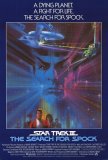Star Trek III: The Search for Spock (United States, 1984)

With a title like The Search for Spock, did anyone really expect that they wouldn't find the erstwhile first officer? So, with the resolution never in doubt (especially considering that Leonard Nimoy was directing), the real question to ask is: Is the search fun? The answer, for the most part, is "yes", at least once the story kicks into high gear. Star Trek III takes nearly forty minutes, much of which is filled with silly, mystical exposition about the current state of Spock's soul, before things start moving. The last twenty minutes are equally slow, but the stuff in between is quite enjoyable.
Star Trek III represents the middle segment of a trilogy begun in Star Trek II: The Wrath of Khan and concluded in Star Trek IV: The Voyage Home. Common themes, characters, and plot elements span all three movies, which, despite being produced over a four-and- one-half year period, take place one after another. With Star Trek II's healthy box office tally and warm critical response assuring the series' immediate future, the ball started rolling on Star Trek III before its predecessor reached video stores. Since just about everyone, including Leonard Nimoy, agreed that Spock couldn't stay dead, the focus of the third Star Trek film was on undoing what the conclusion of The Wrath of Khan had accomplished.
In Star Wars, the deceased Obi-Wan Kenobi came back as a shadowy apparition, but that sort of nebulous presence wasn't what Star Trek fans wanted. They demanded the Vulcan's return in the flesh, and Nimoy, who had finally made peace with his alter-ego, was happy to appease them. In the process, he earned the right to direct the film, a task which he accomplished with aplomb, especially considering the budgetary constraints placed on the production (the film was studio-bound, using all sorts of fake greenery and unconvincing, confetti- like snow in place of the real thing).
The Search for Spock opens where The Wrath of Khan left off -- with Spock's death and funeral. Days later, the Enterprise is limping home, ready to be decommissioned, with the crew awaiting reassignment. Dr. McCoy (DeForest Kelley) is suffering from some sort of unexplainable trauma -- he hides out in dark rooms speaking in Spock's voice and tries to hire a ship to take him back to the Genesis planet, which has been classified as "off limits" for all space travel. A visit by Spock's father (Mark Lenard) to Kirk (William Shatner) reveals that McCoy carries Spock's soul within him, and must be taken to Vulcan to have it exorcised. For the ritual, Kirk must also retrieve Spock's body from Genesis -- a task impeded by Starfleet's policy regarding the new planet. Undaunted, the Admiral, accompanied by his crew, steals the soon-to-be-mothballed Enterprise, and heads into a confrontation with a ship of belligerent Klingons who are trying to steal "the secret of Genesis."
The highlight of The Search for Spock is the ten-minute sequence where Kirk steals the Enterprise. Exciting, well-paced, and perfectly-scored, this gem stands out as one of the best segments in any of the Star Trek movies. Also noteworthy are a confrontation between the Enterprise and a Klingon bird-of-prey (although the "battle", such as it is, is anticlimactic, with the Enterprise's defense systems going on the fritz), the scene in which Kirk orders the ship's self-destruction, and a hand-to-hand struggle between the Admiral and the Klingon commander (Christopher Lloyd).
There are no acting standouts. From Shatner down to Koenig, everyone slides into their familiar roles (although there are a few times when Shatner seems to confuse Kirk with his then-current TV personae, T.J. Hooker). Merritt Butrick, as Kirk's son, has grown into the part, and is significantly better here than in The Wrath of Khan. On the other hand, Robin Curtis, replacing Kirstie "I want too much money" Alley as Saavik, is dreadful -- I know Vulcans hide their emotions, but a wooden mannequin would have been more expressive. Christopher Lloyd (Back to the Future), barely recognizable under all the Klingon makeup, is an adequate villain, but nowhere near as charismatic as Ricardo Montalban's Khan. Leonard Nimoy's brief appearance as Spock near the end represents the most triumphant moment in a film that is, for the most part, surprisingly downbeat.
Like Star Trek II, Star Trek III is about sacrifice. In The Wrath of Khan, Spock gave his life for his shipmates. Here, Kirk loses just about everything except his life so that his friend can have a chance at a future. It's this sort of thing -- placing characters and themes above battles and special effects -- that has always distinguished Star Trek. While the absence of Spock leaves a vacuum in character interaction (there is none of the witty repartee that defines the Kirk/Spock/McCoy relationship), expectations about his return create a palpable sense of anticipation. So, while the sluggish beginning and ending mar this Star Trek outing somewhat, there's still enough here to please fans of the series, and, to a lesser extent, movie-goers in general.
Star Trek III: The Search for Spock (United States, 1984)
Cast: William Shatner, Dame Judith Anderson, John Laroquette, Mark Lenard, Walter Koenig, Nichelle Nichols, George Takei, James Doohan, Robin Curtis, Merritt Butrick, Christopher Lloyd, DeForest Kelley, Leonard Nimoy
Screenplay: Harve Bennett
Cinematography: Charles Correll
Music: James Horner
U.S. Distributor: Paramount Pictures
U.S. Release Date: 1984-06-01
MPAA Rating: "PG" (Violence)
Genre: SCIENCE FICTION
Subtitles: none
Theatrical Aspect Ratio: 2.35:1
- (There are no more better movies of Dame Judith Anderson)
- (There are no more worst movies of Dame Judith Anderson)
- (There are no more better movies of John Laroquette)
- (There are no more worst movies of John Laroquette)
Comments